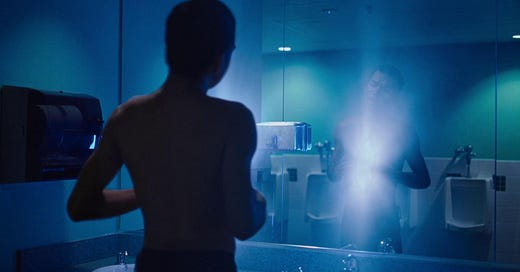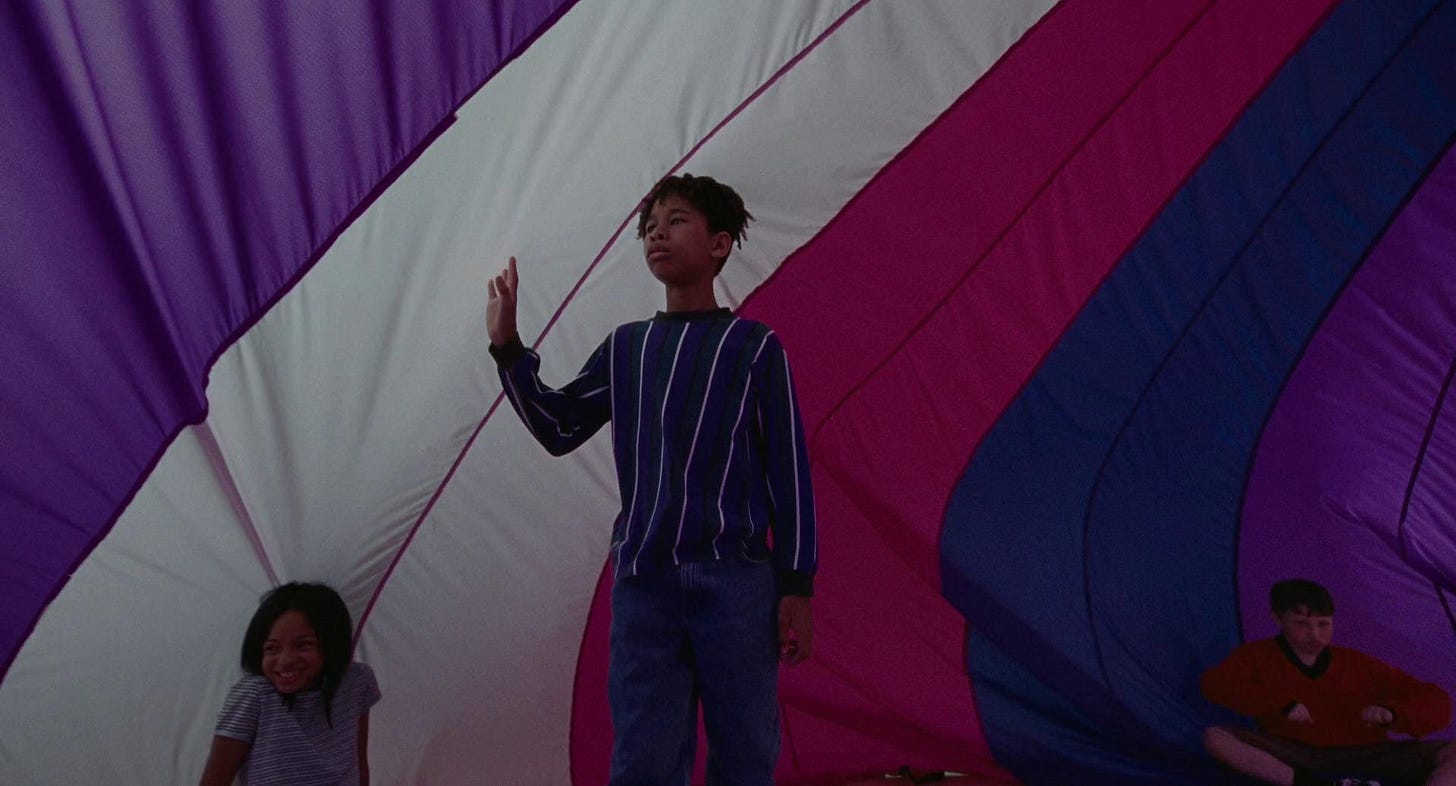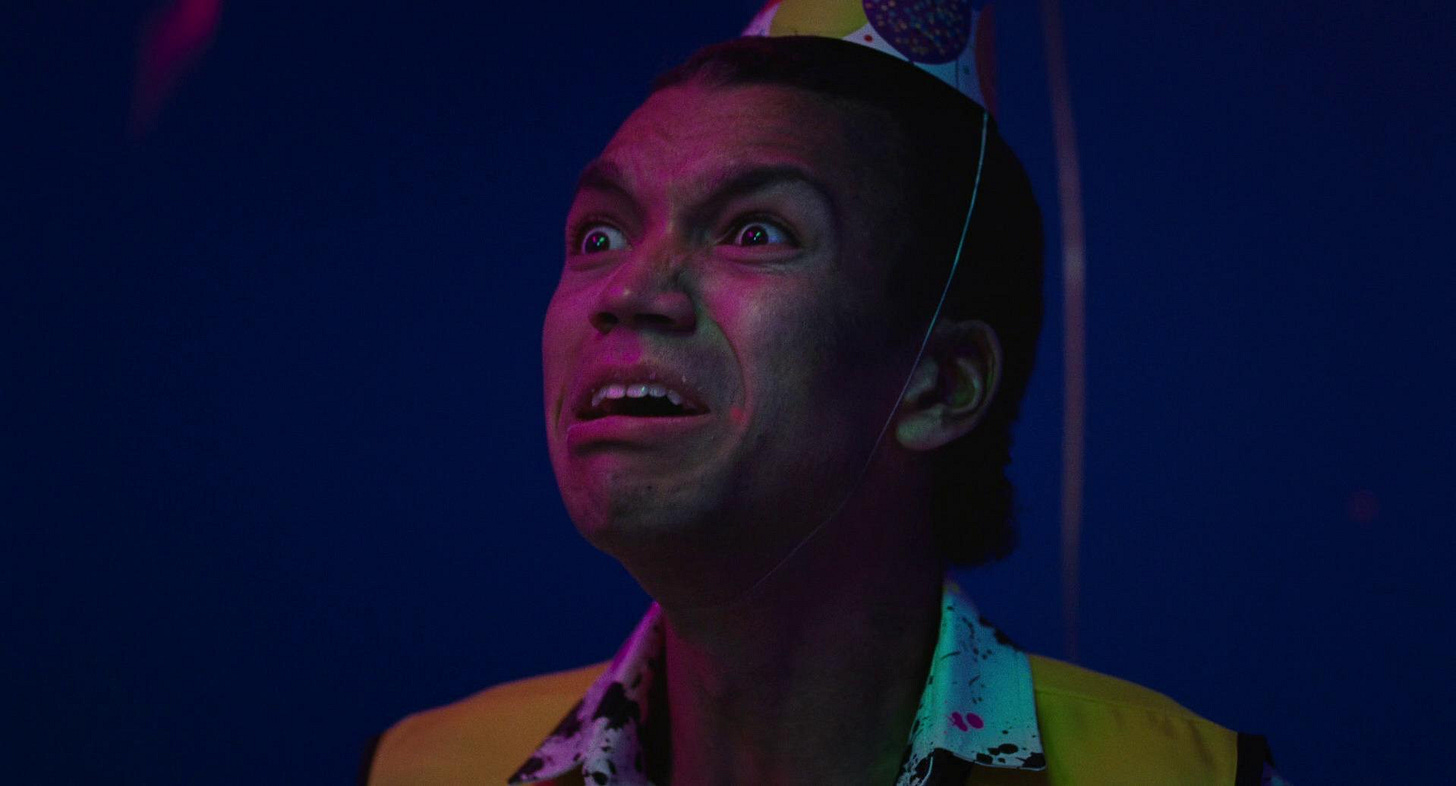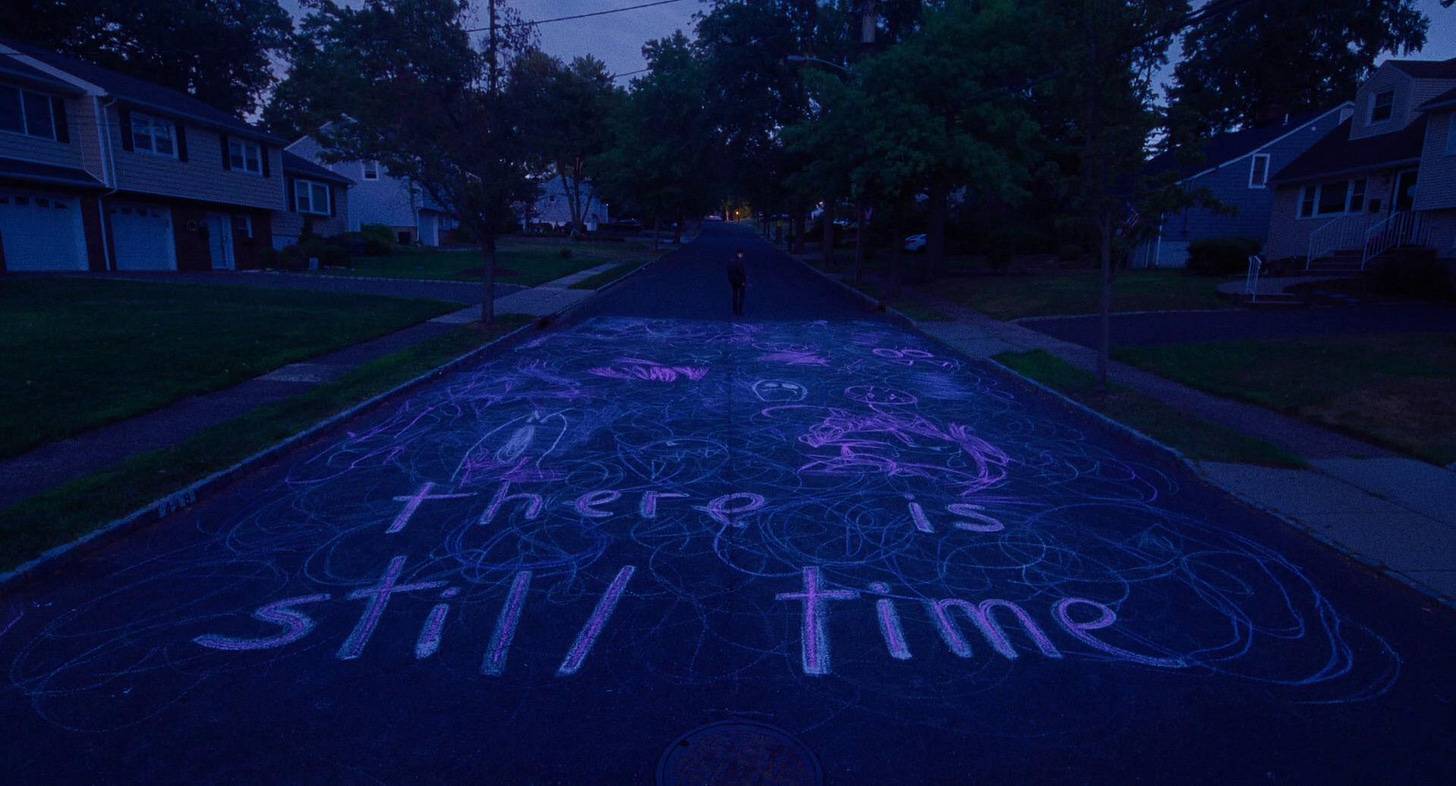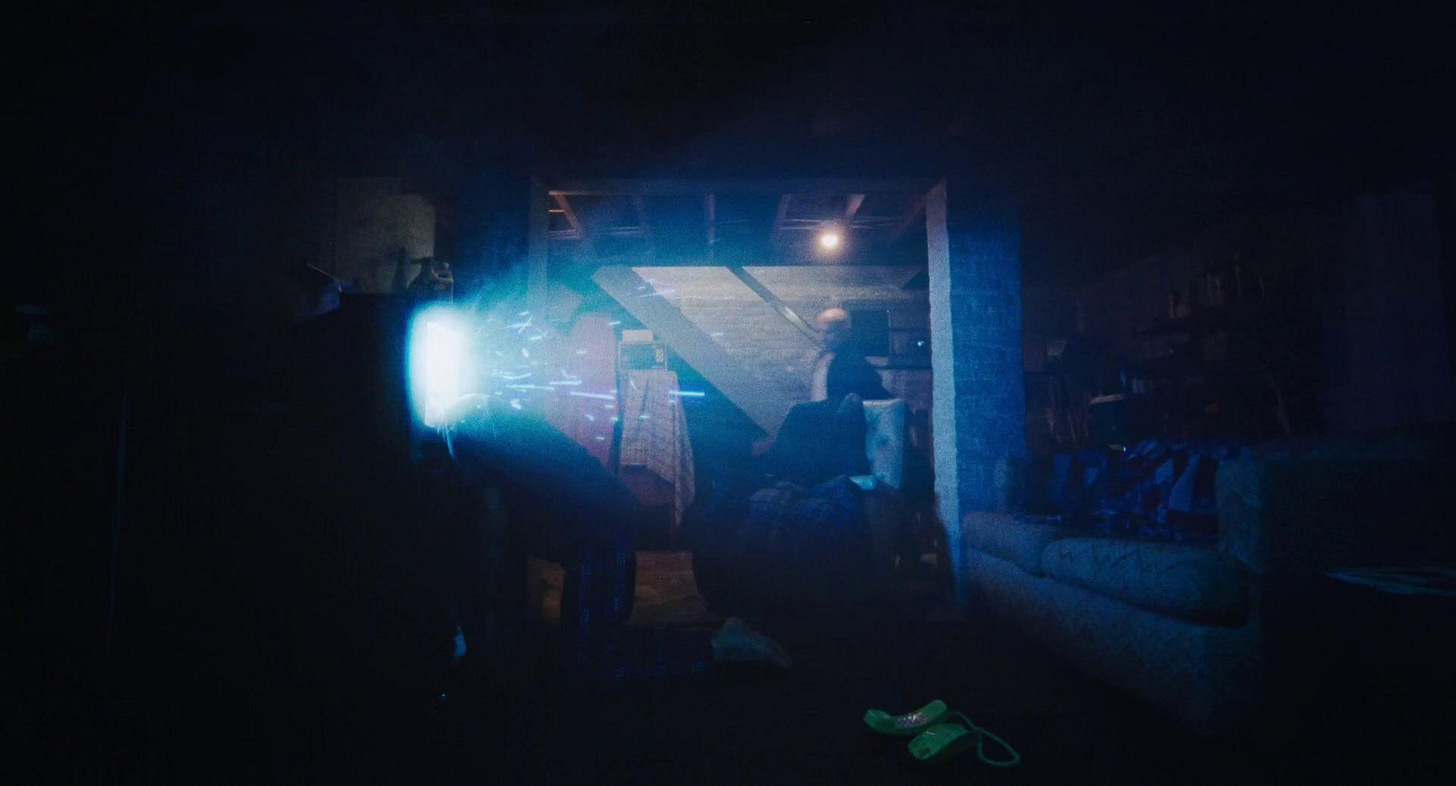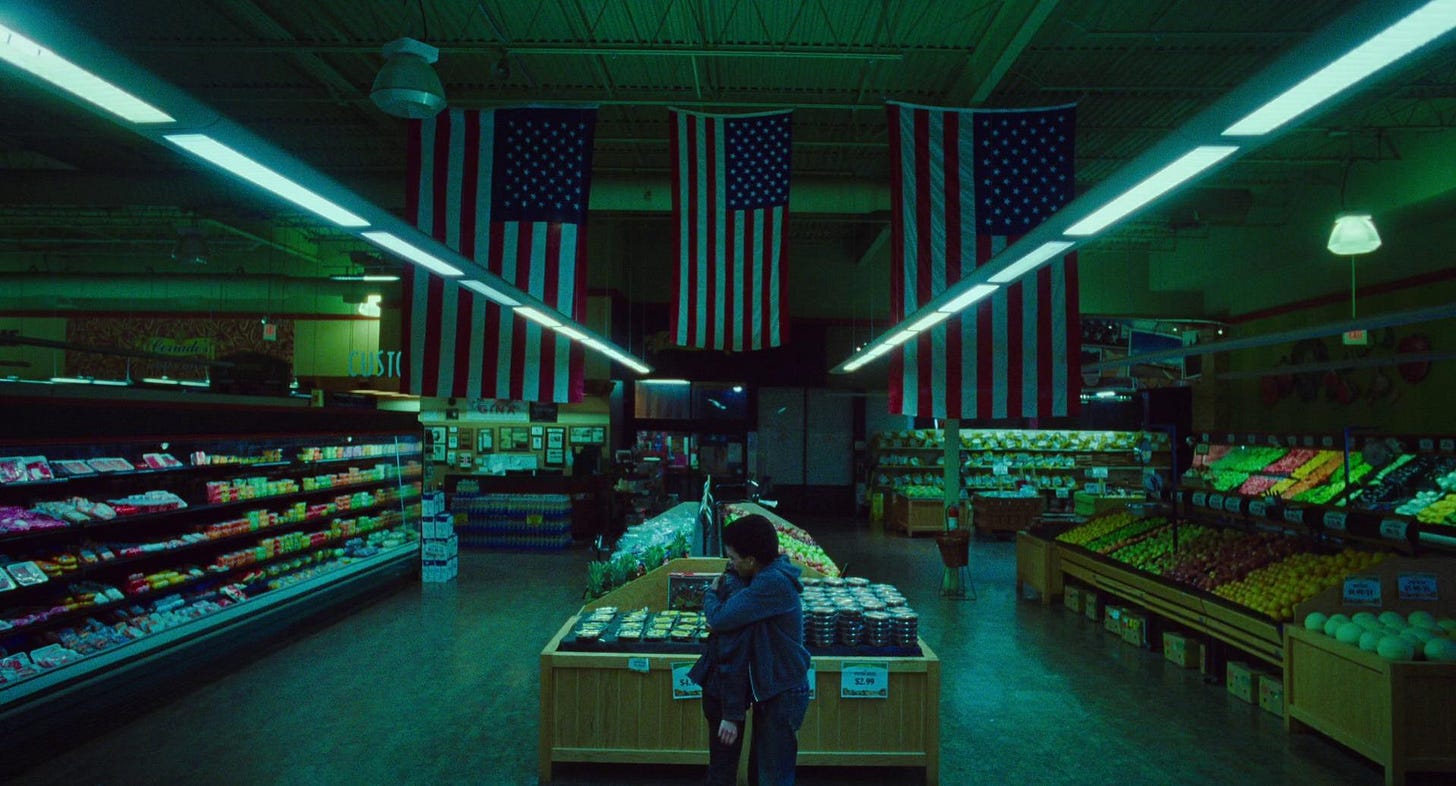Welcome to the first edition of “Change My Mind,” which I hope will be a new recurring column on Marshall and the Movies! Each edition, I will take another look at a film that didn’t quite land for me alongside someone for whom it did — and discuss our shifting perceptions. If you’re a paid subscriber and want to propose a film, I’m all ears.
(Note to some of you: this is unidirectional. You don’t get to pick a film I like and try to tear it down. That’s not what this newsletter is about.)
Film festivals are not always the best environment to watch movies, as counterintuitive as that might seem. I first encountered Jane Schoenbrun’s I Saw the TV Glow as the fourth movie of a long day at Sundance. It was 10 PM (and the screening started exceptionally late); it was my fourth movie of the day; the theater was toasty.
Maybe some of that explained why I came in on the cooler end of what ultimately became one of the breakout successes of the festival’s 2024 edition. I’m glad I had some time to marinate on my mixed feelings about a work that endured for many of my critical colleagues as one of their favorites of that year. Here are some excerpts from my 2/4 star review at Slant Magazine that will help you understand what the film is about and some of my objections to it:
“I think that I like TV shows,” Owen (Justice Smith) confesses when fellow outcast Maddy (Jack Haven) quizzes him on his sexuality. This revelation might sound like a cop-out, but it may be the only instance in I Saw the TV Glow where he’s truly honest with himself and others. As a mid-’90s youth alienated from all aspects of his sterile suburban upbringing, he draws meaning and belonging from the adventures of Isabel and Tara (Helena Howard and Lindsey Jordan) on the campy and creepy teen late-night show The Pink Opaque. In Maddy, he finds a partner in obsession as they geek out over episode guides and other fandom miscellanea.
[…] Schoenbrun floats freely between Owen’s teenage confusion and midlife reckoning with those formative years, just as the edit interweaves his confounding everyday life with the show that captures his imagination. It’s a structurally innovative method of conveying the “egg crack,” a person’s first moment of clarity around their gender mismatch. I Saw the TV Glow is at its most thrilling when channeling this notion of trans temporality, an understanding that the past isn’t a series of fixed events but a set of stories open to reinterpretation in the future.
[…] As the film continues, I Saw the TV Glow becomes more prone to externalizing the dysphoria that Owen experiences. These surrealistic nightmares overtake the film and pull focus away from Smith, whose aching vulnerability in recognizing the emotion he cannot express proves to be the scariest part of the film. […] Because the filmmaker has such a singular sense of storytelling acumen, any craftsmanship repurposed from masters of midnight films like Lynch and Cronenberg sticks out. Especially in a work that so poignantly and profoundly examines what it means to become oneself, it strikes a discordant tone for Schoenbrun to lean so heavily on the artistic signature of others.
I bring a certain set of limitations to my understanding of the film as a cisgender male, and I regret that I wasn’t able to talk about it sooner with my longtime friend Esther Fallick, a fellow Houstonian living in New York. She’s a trans comedian who recently launched the podcast Having Fun with Esther Fallick. But long before anyone ever put a mic in front of her, we’ve been discussing movies since meeting at an August 2009 IMAX screening event known as “Avatar Day” (before then going to see Inglourious Basterds, a perfect double bill).
Her five-star Letterboxd review posted on opening weekend helped plant the initial seed for this column. Was there something I just wasn’t getting about this movie, either through my subject position or my tiredness upon first experience?
So, over some homemade strawberry cake on Memorial Day Monday, Esther and I discussed I Saw the TV Glow and interrogated our shifting feelings on Jane Schoenbrun’s film. Ironically, the first “Change My Mind” column got off to an unexpected start on whose thoughts and views shifted the most from a rewatch…
So I think the person who's probably changed their mind the most from view one to view two is you!
Yeah...
When we were texting about this, you described it as "pessimistic." That wasn't necessarily my read of the film the first time, although it does end with a character saying, "I'm sorry." Can you unpack why that was the sensation you left with?
Well, it's horror. For a person who has strong suspicions that they may be trans but hasn't quite looked at it yet, I can imagine that [the film] rings really true. It may crack some eggs! But [Owen] doesn't ultimately transition, and Maddie's character does, paired with the fact that there are no trans-feminine people in the movie — to use a very flawed term here, there are a lot of AFAB [Assigned Female at Birth] folks. Even the musical artists on the tracklist, it's like, "Why don't you try and get some melancholy trans girls on there? Why did it all have to be these cis lesbian vibes?" Some other movies we were discussing, The People's Joker and Stress Positions, both feature trans women at or near the center. This one doesn't, and it's the one that's elevated.
Those movies are willing to be messier and more transgressive in a way. A note that I made for myself as we rewatched it was: "I Saw the TV Glow is happy to ride off of its subject matter seeming transgressive." Not that I think the egg crack or going through the realization of one's transness is by definition transgressive, but it is when you compare it against the kinds of narratives that are out there in mainstream cinema. Yet it's not transgressive in its form at all. It's stealing so heavily from Cronenberg and Lynch.
And Joss Whedon...
At the very end, I had this sensation of like, "Oh, wow, this almost feels a little bit like a period piece." (I mean, I know that it is.) The way the attitudes in Hamilton felt like they were a period piece the second that Trump got elected, I felt that in this. I was like, "Oh, this is a movie about how the biggest obstacle to coming out as trans and being trans is yourself." And now I'm like, "Well, it's actually the state." [laughs]
Something that struck me, which I don't even think I clocked the first time I watched: who, exactly, is Owen talking to the whole movie? It's ultimately the "audience," which made me think a lot about who Jane Schoenbrun thinks the audience for this film is. My guess is it's probably a cis person.
Yeah!
It is not for the people that it's purporting to be about. It is explaining those people to an audience.
Exactly.
To your point about the state being the issue here, there's a lot of education needs to be done. But you want something like this that is lifted up in the culture to be a little bit more representative of the voices of the people that it's actually about.
The ambient attitudes of the patriarchy are painted as the enemy through the family and the father. The big bad isn't Mr. Melancholy [the villain of the show within the film]. The big bad is the cops!
Another question that occurred to me while watching: is Jane Schoenbrun hiding behind characters who don't have the language to talk about these things because they themselves are not necessarily at that point?
That is actually what I wonder myself.
I'm sympathetic, especially for a subject matter that is so personal and reflective of a journey that's probably still underway. But at what point is that a shield to hide that you don't ultimately have anything particularly profound to say?
I think there's really something there.
A part of me wonders if Jane Schoenbrun will revisit this film later in their career or life, in the way that Kubrick revisited Lolita through Eyes Wide Shut. Different forces, but maybe there was something still under development that meant they couldn't express it to my fullest. With more life experience or distance, maybe they will understand what it actually means.
That's really interesting. I'm generally not a person who's like, "We need more queer joy!" [laughs] I guess it is a horror film, but if the whole movie is just about how scared you are to start hormones, yet you started hormones ... I just don't get it.
If you took away all of the visual flourishes or the Lynchian nature of it, and this was just a straight drama, how would people react to it? They'd be like, "Oh God, this is just a miserable story!"
Yeah, it's so dour! What I will say — and I liked this about We're All Going to the World's Fair [Schoenbrun’s debut feature], too — is that I do feel like Jane Schoenbrun does have this connection to being 14. I just watched the Pee-Wee documentary, and it felt like there was something that Pee-Wee understood about being eight. We all forgot, but Pee-Wee still remembered. Jane Schoenbrun can evoke these feelings that I had when I was 13 and 14, that I forgot that I had. The alienation that you feel behind the screen in a certain way, I felt during We're All Going to the World's Fair. And then here, I do think the abstractness of that feeling of your true self being like buried somewhere else in a different life while you're here, the sensation that brings up in my body is so unique. I've never quite felt that in another movie.
That moment right before Owen plunges into the TV and has the full Videodrome moment, I clocked how the aspect ratios in the film start to shift between him and the show. He's having that moment of transference with the screen. There's a line of blurred reality here.
I'm still not willing to budge on the Lynchian elements of it not working for me because there's no subtlety. But I'm willing to concede that I think some of the Cronenberg stuff works. Maybe not the chest opening up with the Videodrome at the end callback; that's just a little too obvious for my taste.
But Cronenberg's whole thematic thrust is looking at the malleability of the human flesh and ultimately how we become a new self. For Schoenbrun, it's not so much about creating a new flesh but about realizing the flesh that you have is not the one that you're meant to be in. I think that's an interesting inversion of that idea, yeah, but I think it struggles to find a platform and gets bogged down in really obvious visuals.
That reveal about two-thirds of the way through is the strongest part of the movie for me, by far. And I think it's for some of those reasons. It is interesting how that character is unwilling to experience the story in any way outside of through the screen, as opposed to Maddie, who submerges themselves and allows their body to go through this transformation. It's symbolized through travel in a way that Owen is unwilling to do because he never leaves this one location of his hometown.
You mentioned earlier that the answer isn't necessarily that we need more queer joy in culture. But what does a better, or more positive, egg crack narrative look like? How does someone tell this story in a way that isn't spoon-feeding it to cis people as well as being about the joy of discovering who you are without being blind to the pain and trauma?
I actually thought The People's Joker did that pretty well. The whole narrative wasn't about the egg crack, but it was about this character figuring out who they are artistically and in their body. How do they want to relate to other people and institutions (with UCB)? The transness was part of discovering who they were in relation to all those things and is important for the plot in terms of how those things then started treating her, but it wasn't the biggest moment in the film. We got to see how she had a clear shift in her confidence after she started dressing as a harlequin. Even Maddie, Jack Haven's character, crawled through the mud to be like, "You have to do this!" There's no assurance you're gonna feel better.
I wrote down Maddie saying that they have to have the season six premiere of The Pink Opaque. Remember whenever the guy who tried to kill Reagan said he was doing Chapter 27 of The Catcher in the Rye? Was there any self-awareness that this is what it sounds like?!
That's so funny! Yeah, wouldn't that character have learned how to talk about it in a different way? They understand that they have to talk about it to Owen in this way, but would they understand it in a different way? It didn't seem like the character had changed much, other than they had more fear in their eyes now. I feel like part of what coaxed me into transitioning when I was in Owen's position was seeing the happy people. I knew that I was also getting myself into more messes. Life was about to become more scary in many ways, but also it was for something. That's hinted at a little bit when Owen is like, "Is it true that I was someone else? Someone beautiful and powerful..." You didn't sell transitioning! [laughs]
I remember reading the essay that you wrote at the time of your transition, and the Netflix series Sense8 was one of the pieces that was putting those images out there that empowered you. Maybe this goes back to the horror element, but this film is giving a lot of "you're hearing voices" messaging around transness.
What Sense8 helped me understand was my part in the damage I was doing to myself. Jamie Clayton's character gives a monologue to the gay man who's in the closet, telling a story about harassment that she experienced when she was a kid. That violence was ugly, but it was who they were. But the violence that really does the most damage is the violence that you do to yourself when you don't allow yourself to be who you are. Now, I can take responsibility for that and become who I wanted to be. Again, this is the horror framing, so this character is deciding to remain a passive viewer of their own life. They're a consumer.
When we're revisiting movies, it's easy to think that the movie has undergone change, but really, it's we who have changed. The movie is a fixed object. Since you're the one who has moved the most on this film, do you think that part of the way your outlook on the film changed is a reflection of the different place you're at in your life?
That question really resonates. I've been getting to this point with my art and creative expression where I have the part of me that prioritized fame or a certain type of success over anything else is dead and buried. Not every day, but I'm more interested in making work that is less about explaining transness and more about providing trans people with what they need: the laughter, the consolation, the look of understanding. This feels like a work that is trying to explain to us what it means to be trans.
I wrote down at one point about the idea of the audience: Is this turning transness into a theme park for cis people?
Literally. That's a good question. I mean ... that's a little of what I thought, too. [laughs] A transness haunted house for cis people.
To end on a little bit more positive note, where are you finding the creative expression you were looking for in I Saw the TV Glow in culture right now?
I'm always a huge fan of anything Macy Rodman is doing. In literature, there's some amazing writing by trans people that's coming out right now. I just read Tori Peters' Stag Dance and A Short History of Trans Misogyny by Jules Gill-Peterson, an academic. It's a bit of a tough read, but it is really mind-blowing. Other than that, I don't know. I strive to be that. I strive to create work like that.
My thanks to Esther, the first and hopefully not the last “Change My Mind” guest!
Yours in service and cinema,
Marshall


